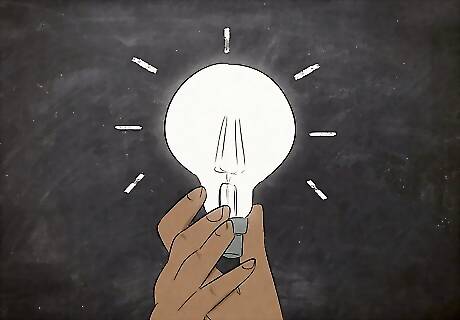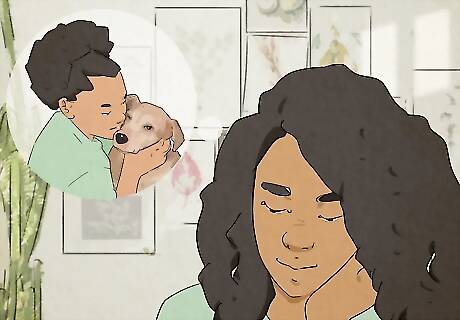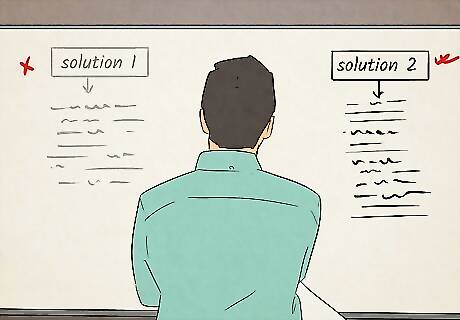
views
- Intuition is more like a gut instinct or reflex—you're hit with it right away.
- Imagination requires mental effort so you can picture ideas or objects.
- Intuition helps you make split-second decisions without second-guessing them.
- Imagination takes more time and allows you to visualize all sorts of concepts.
What is intuition?

Intuition is the ability to suddenly know or access new information. Somehow, you're just hit with an answer that's almost inexplicable. It's almost as if you instantly "downloaded" it. For example, someone or some place might have "bad energy," and you just know you should avoid it. The opposite of that applies, too—if you get a "good feeling" about a person or a situation, then you're using your intuition, as well. For example, you might be inspired to approach a stranger in the library because they strike you as knowledgeable and helpful. They may end up being the perfect mentor you needed for a subject you're struggling with.

Intuition is also sometimes called insight or a “gut instinct.” Oftentimes, intuition feels like an epiphany, or that "aha!" moment. Since it's impossible to ignore and gives you an answer that you feel you can trust, intuition is a type of inner guidance that makes sure you're going in the right direction. For instance, you might buy stocks in a certain company without researching it at all—you're just sure that it's going to make it big. Later, you end up making a profit thanks to your strong intuition.

With intuition, you don’t pinpoint a reason: it’s just a feeling. When you base what you do off of intuition, you're not really making an educated guess. Instead, you're just following a stirring within you. It's an "inner voice" that drives you and that you don't question.

Intuition helps you make a split-second decision. Not only do you instantly process an idea, but you act on it without any inhibitions. In some cases, intuition can be literally life-saving: for example, you might feel called to stay home with your friends just a little while longer and end up avoiding a drunk driver on the road.
What is imagination?

Imagination helps you develop concepts and images in your mind. There's no end to what you can imagine, from a bouquet you plan to buy for your significant other to a puppy you might want to adopt. Imagination also helps you adjust some details: in the previous cases, you might contemplate tiger lilies versus roses or a Dalmatian versus a pug. Intuition would help you know when it's the right time to buy flowers (perhaps because you can sense that your partner needs a pick-me-up) or which dog to adopt from the shelter because its personality would be a perfect match for your family.

Imagination also helps you visualize your desires and intentions. When you want a certain end result, imagination helps you envision not only what the circumstances might look like but also embody the emotion you'd feel in that situation. For instance, you might "see" what it's like to host your own gallery opening and visualize all the stickers on paintings that you sold. Your heart might race as you dream of this possibility, and you might be full of joy and hope. Once you finally open your gallery, intuition would help you sense which patron to speak to as well as which painting to show them in order to facilitate a highly lucrative sale.

Imagination aids in the learning process because you "picture" ideas. Imagination is oftentimes instrumental to knowledge acquisition, especially if you're a visual learner. For example, if you're learning a new language, instead of just memorizing a lot of phrases, you might pretend to order a dish from a waiter, which is a much more immersive experience. Intuition would allow you to know which kind strangers to approach when you're in a foreign country so you can receive directions or tips about local customs.

Imagination is sometimes a form of escapism. In many cases, imagination isn't for preparing for a situation or even for learning—it can just be fun to drift away from reality for a bit. Imagination can help you wile away some time just daydreaming, or it can help you pretend that you're in a different setting, like a majestic kingdom described in a fantasy book. Intuition, by contrast, isn't used for escapism—it allows you to be more alert and keyed into the present moment.
Key Differences

Intuition is based on feelings instead of mental images. Intuition is a quick instinct that is more like a reflex. Instead of picturing anything in your head, you're hit with a strong and visceral sensation, like excitement, fear, or disgust. It helps guide you through situations, and you typically don't stop to second-guess yourself. To check and confirm that you're tapping into your intuition, listen for an inner voice that's protective of you. It'll tell you something like, "I don't get a good feeling about this...'' or "You should go for it! Take a leap of faith."

Intuition doesn't require creativity—it's an involuntary process. While some people say that you can strengthen your intuition over time, you really just learn to respond more quickly. For example, you're more likely to avoid people who might want to take advantage of you or to know it's the right time to tell someone you love them. To check if you're being intuitive rather than imaginative, see if you start to react more quickly to situations. For example, are you making a lot more friends because you sense who has "good energy"? If so, you're likely intuiting information about people.

Imagination requires inventiveness: it takes a lot of mental effort. Sometimes, people say that they have to "strain" to picture a situation. That's because imagination requires you to use all your brain's faculties to "see" a concept or scenario. Ultimately, it takes more time and discipline to visualize an idea or object with vivid detail. For instance, someone might say, "Maybe we could get back together again, but it's really hard to imagine that. There's a couple possibilities I could kind of see, though..." You might also take a lot of time fleshing out a project. For example, you might spend 2 hours creating a vision board to help you imagine the perfect wedding or 40 minutes picturing how you'll give a speech to a big audience.

Imagination helps you envision an outcome, like wealth or success. Intuition is a feeling that you respond to with very little context: it causes you to respond without thinking about a matter too deeply. On the other hand, imagination helps you stop and be more mindful about an idea. Say you want to have more abundance in your life: imagination can help you realize that looks like having a mansion and a master bedroom with a walk-in closet. Certain communities even believe you can manifest anything just by imagining it: while it's fun to think about, it's not scientifically proven.
Is intuition tied to psychic abilities?

Some believe that intuition is a "sixth sense" and a psychic skill. It's been theorized that intuition is a supernatural ability and that some are born with this extra advantage because they're highly sensitive. They might predict what will happen in the future and be able to prepare themselves. Types of intuition in the form of psychic abilities include: Clairvoyance: seeing the future. (i.e., "I can see that you'll win the lottery in 2 months.") Clairaudience: hearing messages. (i.e., "I heard a couple talk about expecting a baby, and I know it's a sign that you'll be pregnant soon.") Clairsentience: feeling others' emotions. (i.e., "Even though you're smiling, I know you're just being brave. I can sense that you're disappointed.") Claircognizance: knowing what someone is thinking. (i.e., "I know what's on your mind! You're about to propose to me.")

Intuition has also been described as a type of spiritual guidance. Many intuitive people describe receiving their answers from another dimension and even believe in spirit guides or angels that give them direct messages. They also subscribe to the idea that if they are deeply connected to their soul, then they'll receive information much more quickly and accurately.

It's been suggested that intuition can be strengthened over time. While some people might be predisposed to psychic abilities or fine-tuned intuition, it's possible to develop greater intuitive abilities with enough practice. Supposedly, the more that you listen to your inner voice, the more likely that you'll continue to cultivate a connection with your soul. For example, if you "listen to your gut" for an entire month instead of ignoring signs or information you're instantly accessing, then your intuitive abilities may become more advanced.




















Comments
0 comment